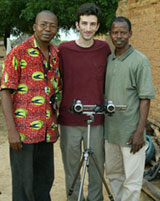Malaria Research and Training Center Provides Base for Advanced Research and Training in Mali
 |
LMVR researchers set up their
cameras to film mosquito swarms
in Doneguebougo, Mali.
Simultaneous filming with two
cameras enables the tracking of
mosquitoes in 3D. |
Malaria remains one of the most serious infectious diseases affecting Africa. NIAID-supported programs at the Malaria Research and Training Center (MRTC) in Bamako, Mali, focus on all aspects of the malaria problem, from studies on the behavior and genetics of malaria-transmitting mosquitoes to the design of disease-control strategies such as the use of insecticide-treated bed nets. The MRTC is viewed by many as a model for research centers in developing countries, as its research is planned, directed, and executed by African scientists. It also provides a robust training program to help form the new generation of Malian scientists critical to the success and sustainability of the program. Current training at the MRTC includes programs in biology, tropical medicine, medical entomology, and epidemiology.
The NIAID Laboratory of Malaria and Vector Research (LMVR) conducts studies at the MRTC focused on two primary areas:
- Evaluating and applying molecular probes developed to detect drug resistance in malaria parasites
- Tests are now in place for the rapid detection of parasites resistant to chloroquine, pyrimethamine, proguanil, and Fansidar.
- Determining genetic and immunological predispositions to severe malaria
Researchers at the MRTC have also collaborated with scientists at the NIAID Malaria Vaccine Development Branch (MVDB) to develop sites for clinical studies of an MVDB-developed "blood stage" malaria vaccine. Researchers are testing the experimental vaccine to see if it reduces episodes of malaria parasitemia (parasites in the blood) in children exposed to the disease.
LMVR has recently established a research program at the MRTC on leishmaniasis, a parasitic infection transmitted by the sand fly. In Mali, the disease is poorly documented, but preliminary studies at the MRTC have shown that cutaneous leishmaniasis (the form of the disease that affects the skin) may be widespread—though usually undiagnosed. As a result, Mali could be a future trial site for leishmaniasis vaccines being developed in LMVR.
In addition to NIAID support, the MRTC labs receive funding from several other international and U.S. agencies, organizations, and universities.
back to top